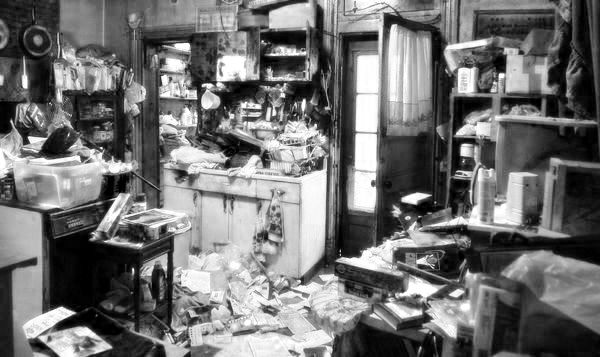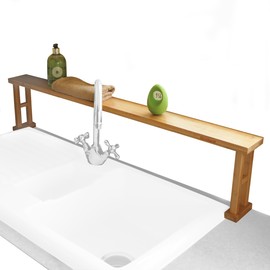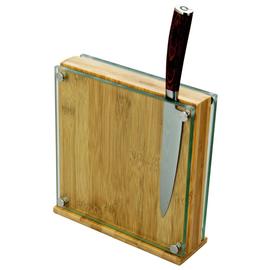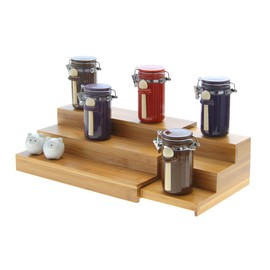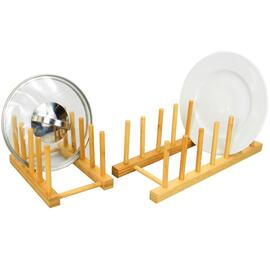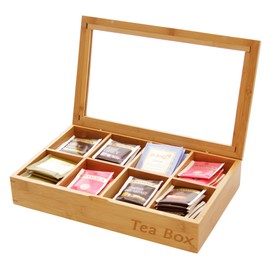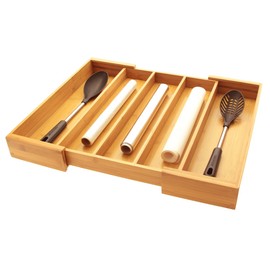The kitchen is the heart of the home. It's where you eat together, where you make your morning cup of coffee, and where everyone gathers when they get home from work or school. It's where you catch up with each other, where you share stories about your day, where memories are made. So it's no wonder it gets messy.
The kids come home from school and dump their school bags in the corner while they raid the snack cupboard and then, of course, forget to take it up with them when they go to their rooms. Oh, and they also put their P.E. kits by the washing machine and their homework on the kitchen table to come back to later.
Or maybe your kitchen is the neglected hub of your bachelor pad, crammed full of appliances that you rarely, or even never use, and overflowing with crockery and cutlery that you've run out storage space for.
Or maybe it's the communal space of a flat share: there are 3 of every utensil, 3 of every appliance, 3 of every pot and pan, but no one thought to buy storage containers or kitchen organisers to keep it all in place. The resulting clutter and chaos can be the cause of tense notes hurriedly scrawled on scrap paper, now littering the room and making the problem worse.
Whatever your kitchen is, it's gonna get messy; that's the nature of a kitchen- mess is made there. But mess doesn't have to stay there.
Why is a de-cluttered kitchen so important?
There are too many reasons why it's so important to de-clutter your kitchen to list here, but here's a select few:
- An unclean and untidy kitchen is unhygienic.
- It will save you time when you come to cook and prepare food.
- Thinking about how you can use organizers and storage ideas will free up a lot of space you never knew you had.
- A mess in the kitchen does not make for an appealing space: the messier it is, the less likely you'll be to want to cook in there.
- A healthy heart makes for a healthy body: keep the kitchen a place of calm and order and the rest of the house will follow suit.
- Otherwise, the mess in your kitchen will spill over into other rooms in your home.
- You will save money. How many of us have double-bought ingredients and groceries because we couldn't see what we needed hiding at the back of a cluttered cupboard?
So how do I do it?
We've got some handy kitchen ideas and space-saving solutions to share with you. To make it as simple as possible, we've split the guide into two sections; the first is how to get started with the de-cluttering, and the second is how to make your kitchen work well and look good once you've cleared some space. The second section is crammed full of kitchen storage ideas, and tips on how to make the best use of organizers and kitchen accessories.
First things first: how to clear, tidy and sort
1) Counters: keep your kitchen counters clear as far as possible. This might seem like a more difficult task than it actually is. We think that we are saving time by having appliances like the toaster, the toastie maker and the smoothie maker all on the kitchen surfaces. But really they clutter the space and affect the overall order of the room. They gather dust and germs and can make cleaning the surfaces a more arduous job. So put them away neatly in a cupboard. Or, if you don't use them too often, store them in another part of the house. And if those counters are clear, you'll be motivated to keep them tidy and clean; that is, you'll be more likely to do your washing up now rather than later.
2) Cupboards: clear them out. And we mean not just of unused or gone-off food but of appliances and kitchen accessories that you know you will never, ever use. Recycle it, donate it to a charity shop: do whatever you like with it, except hoard it in your kitchen cupboards for years to come.
3)You can throw lots of things out at this first stage. You probably have broken things that you're hanging on to - tupperware without lids, rusty tin openers that don't really work - so, get rid of them and you'll instantly have more space in your cupboards. Some appliances can be stored out of the kitchen if they are rarely used. How often do you really use that bread maker?
4) Time to re-house: designate everything a proper home. The first part of this process is to take everything out of your cupboards and your fridge. Yes, it sounds painful, but it is the only way forward. Then have a dried foods section or cupboard, a tinned foods section etc. A system, in short. And try not to change this around too often; people will get confused if they're used to certain items being in certain places and then they won't be able to find what they're looking for. Even worse, they might just put stuff wherever they like and chaos will ensue.
If you share a kitchen with housemates, this new system should be something you decide together, to make sure that everyone knows what goes where, and so that everyone can contribute: 2, 3 or 4 heads are better than one...
5) The statistics relating to food waste in this country are shocking: studies have found that people in Britain throw away 1/3 of their food1. A good tip to reduce wasted food is to put new food behind old food in the cupboards and fridge so that you don't end up with more food than you need taking up space, or, even worse, wasting food by letting it go off. Now's the time to change, and it starts with organising your kitchen. Another way to reduce waste is to have a menu plan, then you can shop accordingly and won't buy unnecessary food that clutters up the kitchen and never gets eaten. It's the small kitchen ideas that can make a big difference.
6) Classic problem areas: the sink, the bins, the kitchen table. These areas get messy and dirty easily and often, so they need particular attention. Key kitchen accessories can help: a sink organizer, an easily-cleaned draining board, kitchen shelves to keep papers and books off the table.
7) As for you bin and recycling area, it's important to designate a space for your bins and to keep it clean, keep it together, and keep it ordered. Here's a storage idea"could you keep the bins under a surface to maximise your space? Or you could attach a small bin to the inside door of a cupboard; this will save you space and reduce mess and clutter.
8) A few rules: the kitchen is for things that belong in the kitchen; it's not the place for papers, post, a P.E. Kit, half-finished homework. Make it a rule of the house that the kitchen is not used for storage, short-term or long-term.
If you can't cook with it or have it for dinner, then put it somewhere else. You could have a halfway house, say a basket where you put stuff that you know doesn't belong in the kitchen, then every evening while dinner is being prepared, someone can take the contents of the basket to their proper place in the house.
Paper piles can be eliminated easily. Use online takeaway menus (don't let the paper ones even enter your kitchen; throw them out before they get there) and online manuals for your appliances.
A couple of quick tips
- Are you a real neat freak? Could you even label your kitchen shelves, label your jars, label the storage racks and keep an inventory on the inside of the cupboard door so that you know what goes in there? Ok, so you don't want to freak your housemates out, but if it helps keep that communal space a happy one, then you might have to take that risk.
- Have a place for the mess; allow yourself one junk drawer. Every household needs a home for miscellaneous items, a place to search through when you've lost your keys, book of stamps, novelty keyring; a place where all the little things seem to end up. A junk drawer might seem counter-intuitive, but it will limit the mess. Crammed full of all your mess, it gives odds and ends a home so that they don't live on the kitchen table or on the counter.
- Make a quick clear-up part of your daily routine.You may have heard the old phrase, 'cleaning the house when kids are growing is like shovelling snow when it's still snowing', and the same could be said for keeping a kitchen clean and clear; there is always more mess being made. But if you spend 10 minutes in the morning and 10 minutes in the evening doing the basics- emptying and loading the dishwasher, clearing and wiping down counters etc., then a tangible difference will be made to the day-to-day look of your kitchen.
- Follow the two-minute-rule: if it can be done in 2 minutes, then do it now.
